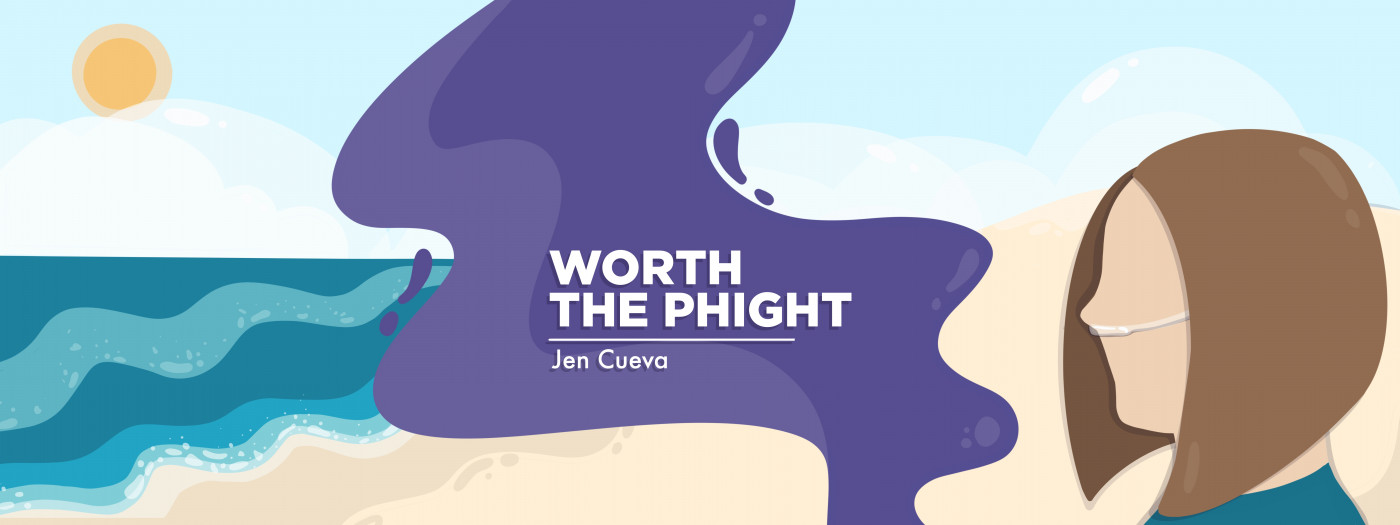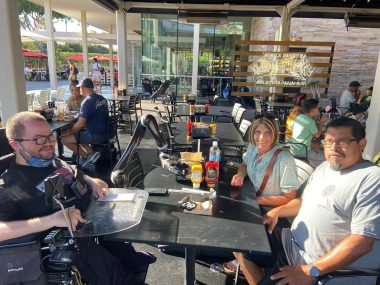How a Friend Inspired Me to Be Proud of My Disability

After my bloodwork a few weeks ago, I stopped by a local 7-Eleven to grab an iced coffee. I parked and went in. An older man came in behind me and said, “Do you know you’re parked in handicapped? You’ll get a ticket.”
I turned around, oxygen cannula and all, and said, “Sorry, sir, I am disabled.” He said I looked so healthy. (Insert eye roll now.) I thanked him for the warning and reminded him that not all disabilities are visible. Imagine how he might’ve treated me if I weren’t using my oxygen at that moment.
This is my reality. I’m not alone. Those of us who live with an invisible disability have to decide every time we go in public if we can or should embrace it. Some of us can pass in public as able-bodied, and while we blend in more when we do, we may suffer from not taking advantage of accommodations we need. Other times, if we do embrace our needs, we might be subjected to harassment or accused of faking it.
Why can’t everyone mind their own business and offer more kindness to one another? Time and time again, I feel the need to prove my disability to someone. In the past and unfortunately still today, people are uneducated and view disability as negative, like a flaw. I’m exhausted from pushing myself to look “well.” Too often, people question my abilities or disabilities.
The first day I needed my accessible parking placards, I cried. Why? Because my pulmonary hypertension (PH) is often invisible, and the placard marked me as disabled. Even though I use oxygen and a wheelchair when needed, this event forced me to grieve things I could do before my PH symptoms and diagnosis.
Last month, I had to switch my disability placard from Texas to California after our move, and I was asked by the kind woman at the Department of Motor Vehicles why I didn’t get the disabled plate for my Jeep. Immediately, I looked at my husband, Manny, and he knew how I felt. But then I thought about it. Yeah, I’m disabled, and it’s OK!
So I now drive my Jeep with my disabled license plate. To some, that isn’t a big deal, but I feel I’m marked or targeted by the general public. At times this causes anxiety.
As we near the end of Disability Pride Month, what better time to share such struggles and remind ourselves that we should be proud? We have different abilities, which makes us part of an extraordinary group.
I’ve learned so much about the resilient people in rare disease communities. Many say that those born with disabilities fare better psychologically than those who become disabled later in life. But it’s not more manageable for those folks. They hear insensitive remarks and get glares and stares, too. They learn to cope with it because their disability is their lifelong “normal.”
Recently, a friend with a genetic disability helped me learn a lesson about my own condition.
Manny and I recently drove to Anaheim to meet my good friend and colleague, Kevin Schaefer, or Kev, as I call him, at Downtown Disney. Kev, a columnist for SMA News Today, was visiting California from North Carolina for the Cure SMA (spinal muscular atrophy) conference. We were so excited because this was a chance to meet up after working closely for over three years.
We went to enjoy lunch together. Manny pushed me in my wheelchair with my portable oxygen machine and Kev in his speedy wheelchair. Kev uses an electric wheelchair and a cool Jaco robotic arm named “Otto.” I watched and admired Kev, asking my husband to assist him so he could enjoy his shake.

Jen, at right with her husband, Manny, with Kevin Schaefer, left, using “Otto” at Downtown Disney in Anaheim, California. (Courtesy of Jen Cueva)
Watching Kev use his chair’s joystick to move the arm to eat, I felt like we had a superhero at the table. But for Kev, this was what he does daily. He’s gained independence since acquiring his Jaco arm. However, he continues to depend on others for assistance sometimes. He never hesitated to ask Manny to lend him a hand.
We laughed as we chatted and tried to smash our massive shakes, but neither of us could — even with Manny’s help.
On the drive home, Manny told me how he noticed some people pointing and staring at us as we ate. I told him, “Hopefully, they were amazed at our superpowers.” Then it hit me. Maybe I’m starting to ignore those stares and glares as I learn to live my life with my disability with pride.
Besides the blessing of meeting my friend in person, I learned a life lesson that day. Kev may not realize it, but he reminded me not to be ashamed of my disability, to ask for help without guilt, and to enjoy a delicious shake, even if I can’t finish it.
Have you struggled to accept or be proud of your disability with PH? Share your experience in the comments below.
Note: Pulmonary Hypertension News is strictly a news and information website about the disease. It does not provide medical advice, diagnosis, or treatment. This content is not intended to be a substitute for professional medical advice, diagnosis, or treatment. Always seek the advice of your physician or other qualified health provider with any questions you may have regarding a medical condition. Never disregard professional medical advice or delay in seeking it because of something you have read on this website. The opinions expressed in this column are not those of Pulmonary Hypertension News or its parent company, Bionews, and are intended to spark discussion about issues pertaining to pulmonary hypertension.









Brenda Denzler
Excellent, Jen! I know in my heart that I'm disabled, but I am very ambivalent about how obvious I want it to be (or for that matter, how official). I don't know that I'll ever be able to say "proud," but to be able to say "comfortable and let the chips fall where they may" would be a good part-way point for me.
I suppose getting a handicapped hang tag for breathing problems is equivalent (for me) to going bald because of cancer treatments. I hated the idea of wearing my illness so blatantly for everyone to see--that bald head covered inexpertly with a scarf or a simple knit skullcap. But I got used to it, and sometimes it led to some heartwarming conversations with complete strangers. Like the time in the restaurant that two people who had been told they had incurable, Stage IV cancers came up to me to let me know that they were many years out from treatment for it, and were cancer free. I never would have had those people to give me hope, had it not been for my bald head.
So maybe getting a handicapped hang tag will lead to other encouraging encounters, as well as the very predictable "You shouldn't park there" comments.
Jen Cueva
Hi Brenda,
I relate to your not wanting to be "obvious." I struggled with that for years. I'm almost at my 18th PH anniversary. So, it took me time. I think one step at a time, and eventually, just as you learned with your bald head, it may lead to positive comments and hope, not only insensitive remarks.
I find this interesting because I think losing my hair and going bald would affect me more than using oxygen or an accessible parking plate. But we never know how we will feel until we are faced with these challenges. I love your mindset about meeting halfway and eventually feeling "comfortable." this is an excellent start. One day at a time, my PHriend.
Thanks for reading and leaving your feedback about such a difficult topic; you're not alone.
I'm sending you hugs and love.
Kindly,
Jen
Vicky Olsen
What a thoughtful, caring and compassionate article. Thank you so much for writing and sharing this with the group.
You have given me hope and a much more positive attitude for today when I am at a low point in my life.
Jen Cueva
Hi Vicky,
I'm sorry that you're at a low point right now. Keep your head up and remember to allow yourself time to feel all the emotions, then move on and remind yourself that you'll make it through, as you've done in the past. You're never alone. Please know we are always here and ready to support you.
Thank you for reading, and I'm so grateful that my column offers you some hope. Your kind words mean more than you know. Take care, my PHriend. I'm sending you hugs, love, and prayers.
Kindly,
- Jen
Jeffrey Harpp
As a parent of Phighter , I’ve made numerous observations of the general public with my son. I see their eyes when looking at him in his wheelchair and oxygen. While looking mostly wiped out, he doesn’t always look like societies skewed untrue definition of a “person with a disability.” I see all the stares most are looks of pity. Some are stares of anger, like mad that you are not as “sick or disabled” for them so you must be faking. Other stares are nervous and apprehensive, which say I don’t want you getting me sick. Which we all know PH isn’t contagious. At times it’s hard for me to not get in their face and have a conversation. My son wants what everyone wants, to be included and treated equally. However, we still lag behind complete inclusion. We still do not have fair accommodations and access for our disabled. We still haven’t educated children to reach out to disabled children driving inclusion. We need significant work to do to fight for basic deserved essential needs.
Jen Cueva
Hi Jeffery,
My heart sank as I read your comments. As an adult, this is challenging and frustrating; I can't imagine how difficult this is for our little PHighters. One thing I've noticed during my almost 18 years of PH, these little ones are so resilient and inspire me beyond measure. It doesn't mean it's accessible by any means. Like your son, we all want inclusivity, and you are correct. We fall behind on education and must push this point on many levels.
I applaud you for not "getting angry in these people's faces" when they stare and make insensitive comments. My hubby often asks what they are staring at, but I think, like me, he has about given up on that. It's no use wasting our energy. I've tried educating others; at times, they are interested, and others continue to make assumptions. Why would anyone "fake" such a horrible feeling if these people only knew when we go through daily? This includes our amazing and supportive caregivers, like you.
Thank you for reading and sharing your experiences on such a challenging topic. Please share with anyone you think may benefit from reading. If you haven't yet joined us in the PH forums, we would love to have you. I co-moderate there, and we have outstanding supportive members. I'll share that link below. You're not alone.
PH News forum
I wish you and your son a "feel good" weekend, and don't forget to smile and find time for yourself.
Kindly,
- Jen